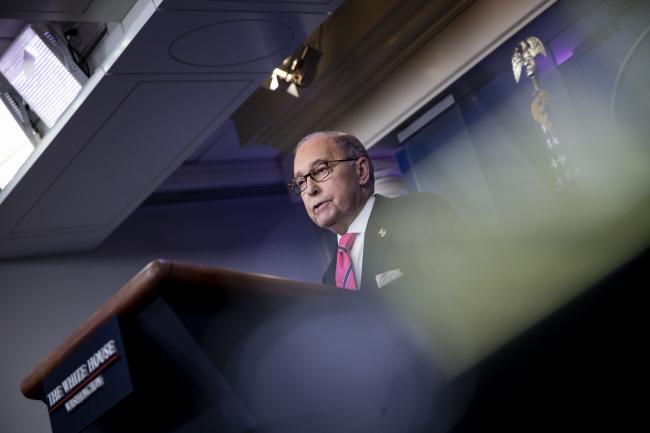 © Bloomberg. Larry Kudlow Photographer: Al Drago/Bloomberg
© Bloomberg. Larry Kudlow Photographer: Al Drago/Bloomberg (Bloomberg) — President Donald Trump is heading to a trade showdown with China’s Xi Jinping with something that a few months ago would have seemed improbable: allies.
Investors and businesses around the world are hoping that when Trump sits down with his Chinese counterpart on the sidelines of the Group of 20 summit in Argentina on Saturday the two may be able to negotiate a ceasefire in their tit-for-tat tariff war. Such a truce would at least delay an escalation to the trade conflict between the world’s two largest economies, a major risk hanging over the global economy going into 2019.
Trump and his supporters have repeatedly argued any such deal will be the result of the leverage Washington has built over Beijing from the tariffs the president has come to cherish. The U.S. has imposed duties on $250 billion in Chinese imports in recent months. A 10 percent tariff on $200 billion of those goods is due to rise to 25 percent on Jan. 1. Trump has also threatened more to come.
Yet perhaps equally daunting for Xi is the fact that he’s entering this week’s G-20 summit with far fewer friends than he might have expected. And that Trump’s aides have, despite the president’s regular tirades about allies and the EU in particular, managed to build at least a tentative coalition to confront China.
World Agreement
“The rest of the world agrees with us,” Larry Kudlow, head of Trump’s National Economic Council, told reporters on Tuesday.
Any coalition remains fragile. European and Japanese officials say any cooperation they now have with Washington on China could collapse if the U.S. proceeds with provocative plans for new auto tariffs that would hit European and Japanese companies hard. The EU and Japan have been angered by Trump’s refusals to grant them exemptions from steel and aluminum tariffs he imposed earlier this year.
EU officials privately also say that dealing with the Trump administration remains challenging thanks to the president’s unpredictable outbursts. In a tweet last weekend, for example, Trump associated anti-government protests in Paris with his longstanding complaints about the EU’s trade surplus with the U.S.
Still, Beijing and Xi have reason to be concerned.
Trump has done everything possible to anger allies and “not isolate China and China seemed to have all those cards in its hands. But there is a sense that something is shifting,” said Eswar Prasad, a Cornell University expert on trade and the Chinese economy. “There is a very subtle and unexpected shift in the international dynamics.”
That shift, Prasad said, was reflected at this month’s APEC summit in Papua New Guinea, where China found itself more isolated on trade than the U.S. and drew scorn for blocking a final communique over its wording on protectionism.
But behind it are also shared complaints from U.S., European and Japanese companies doing business in China and a growing feeling among them that Xi’s leadership has made life harder for foreign investors.
“American businesses, European businesses and Japanese businesses all share the same concerns. And they are all asking, ‘What do we do about it?’ ” said Peter Chase, a former U.S. diplomat now at the German Marshall Fund in Brussels.
All three economies are working together to draft new rules so that the World Trade Organization is better equipped to deal with things like Beijing’s industrial subsidies and policies that force foreign investors to hand over technology as a cost of doing business in China. Together with other longstanding U.S. allies such as Australia they are also applying new scrutiny to Chinese investments and loans.
Constructive Talks
EU Trade Commissioner Cecilia Malmstrom on Tuesday called the discussions with the U.S. over reforming the WTO “constructive’. Like many around the world, Malmstrom said she considered the Trump-Xi meeting the main event at this week’s G-20 summit.
“The whole world is looking at this as a moment maybe not to resolve all their disputes and disagreements but at least a moment where tensions can de-escalate,” she told reporters.
European officials say this weekend’s Trump-Xi meeting will define where the coalition goes next.
The push to reform the WTO is a slow-moving one, and as Japanese and European negotiators have been engaging with the U.S., they have also been approaching Beijing.
WTO Concerns
One of their messages: China will have to address Trump’s concerns and be willing to give more if it wants to preserve a WTO that Trump also has in his sights. The end-goal they have in mind, senior trade officials say, is an agreement on industrial subsidies or the behavior of China’s state-owned enterprises that could take years to hash out.
In the end that all may be too nuanced and slow for the notoriously impatient Trump.
Heather Conley, who served as a senior diplomat in the George W. Bush administration and is now at the Center for Strategic and International Studies, said while the discussions between the U.S., EU and Japan over how to deal with China now seemed fruitful, that may not last. In the end, Trump’s instincts and worldview remain.
“The problem is as it creeps higher it gets caught up much more in the president’s view,” Conley said of the U.S. discussions with the EU and Japan. “The president sees allies as our weakness, as a drain on our strength rather than a strength. That’s an entirely different approach from past presidents.”
Source: Investing.com




























